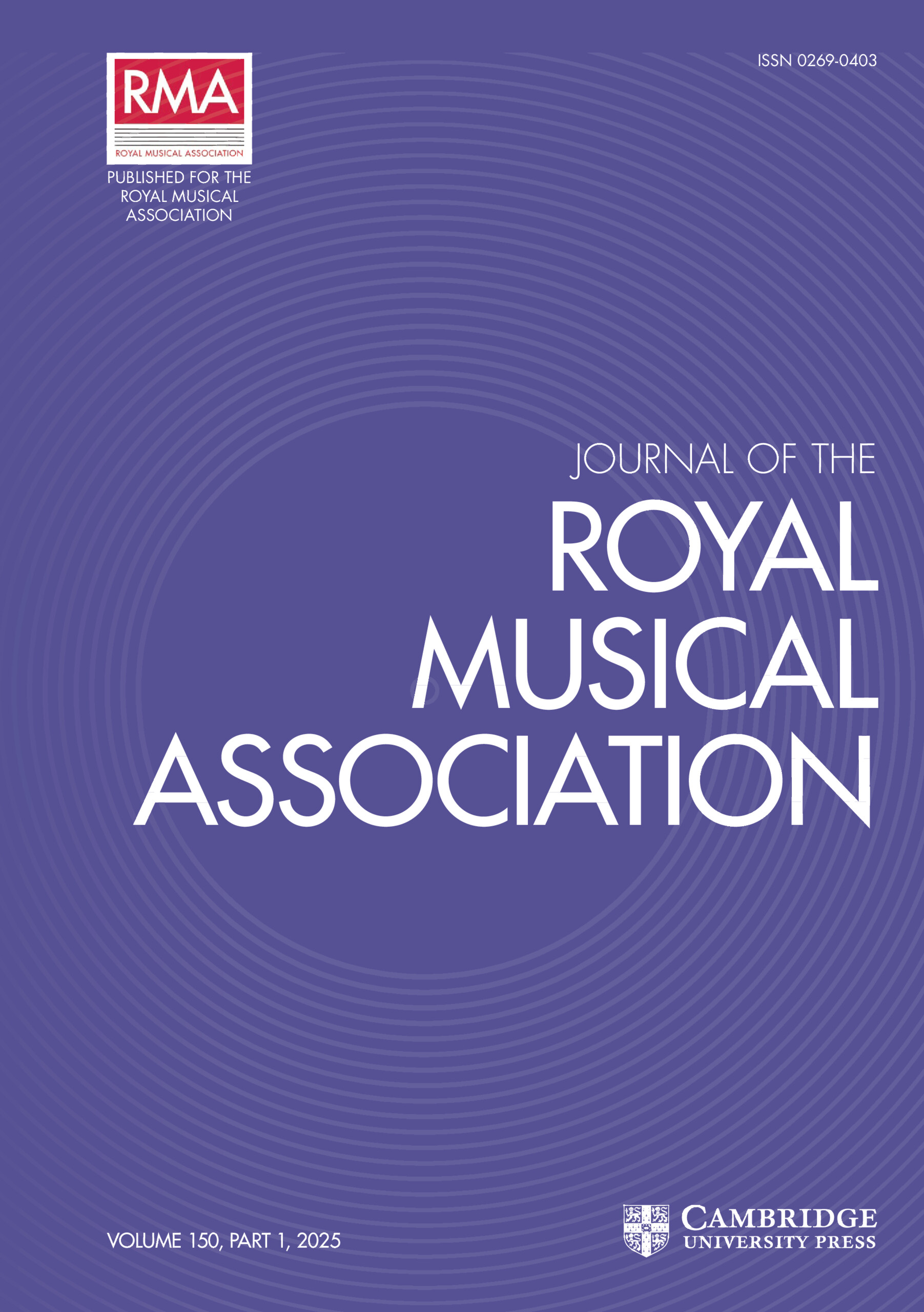Article contents
Provincial Concerts in England, 1865–1914: A Case-Study of Bradford
Published online by Cambridge University Press: 01 January 2020
Extract
It is a commonplace that the nineteenth century witnessed a flowering of provincial musical life, and nowhere was this more pronounced than in the field of concert promotion. However, with a few notable exceptions, such as Michael Kennedy's work on the Hallé, little close scrutiny has been given to the topic. This paper seeks to give the provinces the attention they deserve.
- Type
- Articles
- Information
- Copyright
- Copyright © 1989 Royal Musical Association
References
1 Kennedy, Michael, The Hallé Tradition (Manchester, 1960).Google Scholar
2 Alan Peacock and Ronald Weir, The Composer in the Market-Place (London, 1975), 38–40.Google Scholar
3 Victorian Bradford, ed. David G. Wright and J Anthony Jowitt (Bradford, 1982).Google Scholar
4 William Cudworth, Music in Bradford (Bradford, 1885).Google Scholar
5 Hird, Horace, ‘Samuel Smith and his Music Hall’, in his Bradford Remembrancer (Bradford, 1972), 179–87; Bradford Observer, 31 October, 21 November, 5 December and 19 December 1861.Google Scholar
6 Bradford Observer, 9 February 1865.Google Scholar
7 Elliot, Adrian, ‘Social Structure in the Mid-nineteenth Century’, Victorian Bradford, Table vii and pp. 103–8.Google Scholar
8 Although still offering subscriptions, the concerts are now organized by the local authority music officer.Google Scholar
9 Pratt, M., ‘The Influence of the Germans on Bradford’ (BA dissertation, Macmillan College, Bradford, 1971).Google Scholar
10 The Listener. 27 December 1945.Google Scholar
11 Ehrlich, Cyril, The Music Profession in Britain since the Eighteenth Century (Oxford, 1985), 62.Google Scholar
12 Anon., Bradford Subscription Concerts A Retrospect (Bradford, 1964), 11.Google Scholar
13 Delius, Clare, Memories of My Brother (London, 1935), 21.Google Scholar
14 Weber, William, Music and the Middle Class (London, 1975).Google Scholar
15 Hardman, Malcolm, Ruskin and Bradford: An Experiment in Cultural History (Manchester, 1986), 7–9: Bradford Observer. 15 March 1865.Google Scholar
16 Burnley, James, Phases of Bradford Life (Bradford, 1871), 13–22.Google Scholar
17 Yorkshire Observer Budget, 30 January 1926; Burnley, Phases, 13Google Scholar
18 Elliot, Adrian, ‘Municipal Government in Bradford in the Mid-nineteenth Century’, Municipal Reform and the Industrial City, ed. Derek Fraser (Leicester, 1982), 112–61; Bradford Observer, 25 September 1856.Google Scholar
19 Weber, Music and the Middle Class, 8–9.Google Scholar
20 Yorkshire Observer Budget, 6 June 1930.Google Scholar
21 Mackerness, Eric, A Social History of English Music (London, 1964), 177. 1 hope I do not appear to be using this book as an Aunt Sally at this point. Mackerness is an historian to whom those of us writing since the 1960s owe the greatest debt.Google Scholar
22 The first set was organized by William Morgan, eventually Mayor of Scarborough, the second by Walter Holmes.Google Scholar
23 There were, for example, 542 subscribers in 1884–5, 701 in 1889–90, 687 in 1894–5, 649 in 1898–9, 611 in 1904–5, and 617 in 1908–9. Figures, and those following, compiled from concert programmes in Bradford Archives.Google Scholar
24 Russell, David, Popular Music in England, 1840–1914 A Social History (Manchester, 1987), Chapter 10.Google Scholar
25 Bradford Observer, 9 February 1865.Google Scholar
26 For religious change in this period, see Hugh MacLeod, Class and Religion in the Late Victorian City (London, 1974). On changing male élite culture, see Yeo, Stephen, Religion and Voluntary Organisations in Crisis (London, 1976); Martin Weiner, English Culture and the Decline of the Industrial Spirit 1850–1980 (Cambridge, 1981).Google Scholar
27 These figures were taken by Samuel Midgley from the diary of the first subscription committee chairman, Hermann Averdieck. Yorkshire Observer Budget, 6 June 1930Google Scholar
28 Programme for 16 December 1904.Google Scholar
29 Yorkshire Observer, 17 February 1912.Google Scholar
30 Yorkshire Observer Budget, 15 May 1909Google Scholar
31 I am very grateful to Elsie Arnold for supplying me with some of Midgley's writings Midgley was her husband, Denis Arnold's, great-uncle Midgley's autobiography is a useful source on a number of musical issues Samuel Midgley, My Seventy Years' Musical Memories (London, 1934)Google Scholar
32 Yorkshire Daily Observer, 20 and 28 September 1907.Google Scholar
33 Ibid., 31 August 1907 His most sustained argument fur municipal sponsorship came in his lecture ‘Music and the Municipality’, Bradford, 1912.Google Scholar
34 Yorkshire Daily Observer, 17 August 1907.Google Scholar
35 Adelman, Paul, The Rise of the Labour Party (London 1972), 36. J. Anthony Jowitt, ‘Late Victorian and Edwardian Bradford’, in his Bradford 1890–1914 The Cradle of the Independent Labour Party (Bradford, 1980), 4–23Google Scholar
36 These are aggregate figures over the three separate votes. Voting Figures from Bradford Council Minute Book no 20, Bradford Archives; party affiliations from Bradford Trade and Labour Council Yearbooks. 1904–8.Google Scholar
37 Yorkshire Observer, 17 August 1907.Google Scholar
38 Ibid., 26 October 1907Google Scholar
39 For Leeds, see Russell, Popular Music, 38–40; for Plymouth and Salford, The Musical Times, January 1910 and February 1914Google Scholar
40 His Musical England (London, 1910) is a rich source for the whole topic of state sponsorship For a recent academic viewpoint, see Minihan, Janet, The Nationalisation of Culture (London, 1977), 148–50.Google Scholar
41 Yorkshire Observer, 2 February 1911.Google Scholar
42 At amateur level as well as professional. Eric Mackerness, Somewhere Further North (Sheffield, 1975), argues that there were so many amateur bodies that they put each other out of business. The Musical Times gives an excellent record of provincial orchestral life at this time.Google Scholar
43 The Musical Times, April 1914Google Scholar
44 Extract from their ‘Performing Arts. The Economic Dilemma’, 1966, repr. in Mark Blaug, The Economics of the Arts (London, 1976), 170 They were talking of the North American experience, but claim Britain to be ‘remarkably’ similar In a different context, such as at a brass band contest or in a music-hall, art music did become available to a very broad social spectrum.Google Scholar
- 2
- Cited by


